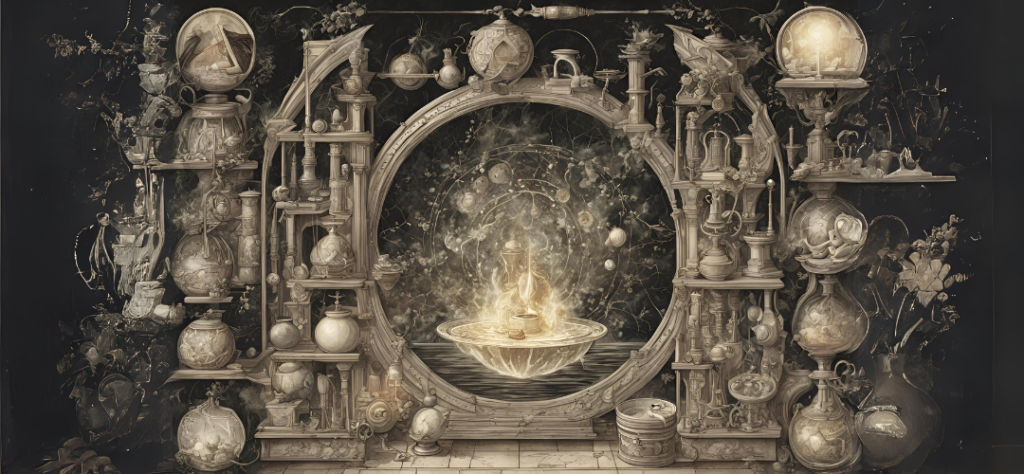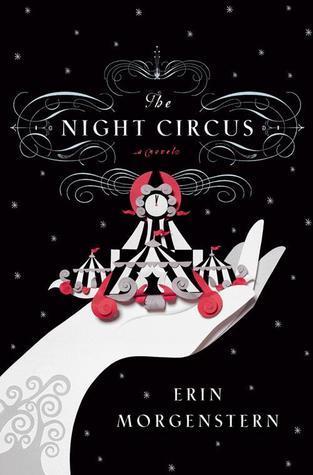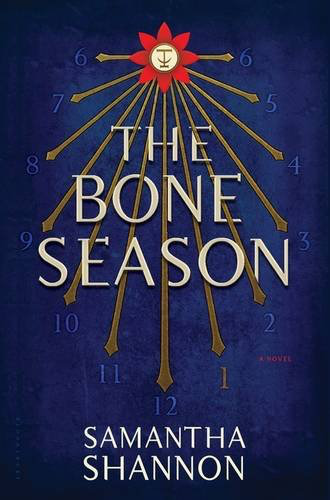
The Alchemical Art:
Exploring Alchemy in Fantasy Worlds
In fantasy literature, the element of magic consistently captivates readers’ imaginations. But with the inset of magic comes the author’s responsibility of setting up the system from which the magic falls under. Magic systems refer to the rules, restrictions, and abilities that define magic—its theories, rules, and connections. And while writers often create significant systems, with levels and levels of depth, spending days, weeks, months, and sometimes years to integrate the system into the work, their readers will always quickly find an answer to what makes the magic truly captivating, for them, sometimes within the first page. This series of blogs is about understanding magic systems. Today we are discussing Alchemy, the magic of transforming matter through potions, elixirs, or transmutations.
Initially, I found magic systems usually fall under just three grand levels:
- Rule-based – a magic system that follows specific rules, laws, or principles that govern its use and behavior. Think of novels like The Name of the Wind by Patrick Rothfuss.
- Soft Magic – a magic system that lacks clearly defined rules or limitations governing the use of magic. Think of novels like The Hobbit by J.R.R. Tolkien or The Night Circus by Erin Morgenstern.
- Symbolic – a magic system based on symbolic gestures, objects, or rituals that represent larger concepts or ideas. Think of novels like The Bone Season by Samantha Shannon or The Ten Thousand Doors of January by Alix E. Harrow.
Read more about the different types of magic systems here.
Alchemy falls under both rule-based magic systems and symbolic, depending on how it’s portrayed in a story. In some novels, alchemy operates according to specific rules and principles. Practitioners must follow precise procedures and formulas to reach desired outcomes like transmuting one substance to another or creating a potion with specific effects. For example, Harry Potter uses a potion to transform into Gregory Goyle. He uses a Polyjuice potion, which is complex and time-consuming to make. The idea that a witch or wizard might make evil use of parts of the body is an ancient one and exists in the folklore and superstitions of many cultures. This approach treats alchemy more like a science, with predictable outcomes based on established laws or principles.
And still, there is symbolic alchemy portrayed in a more mystical manner in Harry Potter. The process and symbols represent for inner transformations, spiritual growth, or the quest for enlightenment. The Philosopher’s Stone of the Harry Potter novel is believed to have the power to transform base metals into gold and grant immortality. The Deathly Hallows—the Elder wand, Resurrection Stone, and invisibility cloak, are the alchemical stages of the Great Work—Power, resurrection/rebirth, and concealment. Also, there are themes of redemption and the search for inner truth, all symbolic magics using various forms of alchemy magic.
As a writer, these Alchemy magics enrich the narrative and provide readers with a deeper understanding of the story’s underlying themes. The reader is able to be immersed in the story because Alchemy has roots in real-world history, which can lend authenticity and depth to fantasy worlds. The magic is grounded in a sense of tradition and mystique. Writers can invite readers to ponder deeper philosophical questions and engage with the narrative on multiple levels. Alchemy magic systems often involve mystical rituals, arcane formulas, and exotic ingredients. Descriptions of alchemical processes and experiments can create a sense of wonder and fascination, drawing readers into the mysterious world of the alchemist. The discovery of rare or elusive ingredients and the careful preparation of potions and elixirs can evoke a sense of adventure and discovery, driving the plot forward and keeping readers intrigued. The pursuit of alchemical knowledge can drive characters to confront their deepest desires, fears, and moral dilemmas, leading to compelling character arcs and emotional resonance for readers. And lastly, Alchemy magic systems can be seamlessly integrated into the world-building of a fantasy setting, shaping its cultures, religions, and societies. Alchemists might hold positions of power and influence, operating within secretive guilds or academies dedicated to the study of their craft, Mr. Snape.
In my serial-published novel Sparrow’s Legacy, one of the mages of Flarentine is forced to use his own alchemic prowess to summon demons to hunt down the remaining prodigy of the late Sparrow.
Here is a snippet of the novel:
The long black floor-to-ceiling curtains, covering where windows might be, decorated the dark-walled room. Yet no air stirred, and all light was absent. Thick, barren walls were soundless from the rest of the building. The only piece of furniture, a waist-high stone table, its shiny black lacquer surface reflecting a shimmering liquid shine from the dimly lit candelabra hanging in the center of the space, the pungent scent of oil burning from above. Various items were on the table surface—a small sand table, a few sheets of paper and an ink well with a feathered ink pen, a finger-length dark purple crystal rock, a goblet of some chilled liquid, and an open book. Yellow pages, tinted edges, some foxing upon the exposed pages, and a visible brittle stiffness as the pages refused to lie flat against one another, revealed the book’s ancient nature. The esoteric hand-drawn symbols, the archaic glyphs, and the words on the pages were more of a pattern of design than a language. But they displayed a magical base of runes to summon, bind, and interact with dark creatures.
A still figure stood behind the table, a cowl draped over the features, hands folded within the sleeves. A hissing pop broke the silence. The small crystal lying on the table vibrated. It rattled in place with controlled violence. The air above thickened and swirled upward from the crystal. A circular funnel widened and climbed. In the center depths of the swirling movement a shape formed, its bending contour blurring and morphing with impossible angles as it grew in size. The clicking noise of the crystal became louder and slowed as it knocked against the table. With a final, slow, methodical beat, the swirling air dissipated to reveal the creature within.
“Why do you call me Mage Besinger?” The nebulous figure demanded, its grainy voice noticeably struggling against its forced containment.
The man’s hands, fingers adorned with jeweled rings, appeared from the robe and pushed the cowl back slightly to reveal silver-streaked hair and an equally gray pointed beard jutted from a chin. He lifted his face to the question emanating from the creature, his eyes still closed. Pocked skin and rugged features seamed with deep lines, carved the scaring evidence of powerful magics using dark forces into him. Those eyes snapped open, revealing onyx-filled depths, the sclera completely black, as if deep-veined blood filled his sight. His face twisted with rage. “Do NOT say my name, demand of the damned. You shall bend to my will and fulfill my needs, Keshik.” He bellowed.
The creature moaned and writhed as the words rebounded in the room.
“To name a thing is to own a thing. You do not own me.” The mage clarified.
“I can do such as you ask.” It stated the grit of compliance against its will.
The man stared at the shifting creature and waited. Time seemed eternal.
“Asssskkk.” The creature wailed.
Mage Besinger smiled in satisfaction.
“Capture the girl and boy kin, I seek.” He held up a single hair and flicked it into the swirling air. It became another mote for the funnel. “You will find them in the Arish lands. I want the minds to…” he smiled again. “…take back something I lost.” His hand clenched at the fleeting memory of Pashier Endric stealing his magic.
“This task is not a path revealed. There are…” the creature twisted and flinched. “There are…unknowns. And the two are not without power. I am unable to…”
The man slammed his fist down on the table. The crystal jumped up and back down.
The creature screamed. The walls echoed until they absorbed the sound.
“Tell me a resolution.” He spoke in a rigid tone, his teeth clenched.
“A mind slayer, perhaps, to possess? This is within your skills. But only the boy. The girl is…resistant.” The creature reached out an arm and scratched through the air like a cat.
The Mages’s eyes narrowed as he contemplated the information. “Tell me of this resis…”
The room’s lone door burst open, propelled as if by a giant hand, slamming against the wall with intensity. A slight sizzle in the air and the crackle of magical power spoke of the intruder’s identity. Mage Besinger lost his focus for a moment and his black eyes cleared to the simple brown of his natural sight.
The twisting figure in the swirling air instantly collapsed into itself and folded the air to return to the crystal, as if putting smoke into a bottle. The Mage turned to rip the intruder limb from limb but found himself suddenly frozen in a pocket of energy surrounding his body. He floated in the air, brought before the visitor, Pashier Endric.
“Why are they not dead yet? Why was I told about their escape? Did you not tell me you conjured Banshees and Vagaliers? My seer reports they brought the creatures down. By children, Besinger. Children! Why are they not dead?” He began in a conversational tone and let it rise to open screaming as he clenched his fist and moved the pocket smaller to graze against the Mage’s skin. Burn marks appeared lacing across his neck and arm.
“A Flarentine, Pashier, aided them,” Besinger gasped. “And additional companions. They are being helped, my lord. But I’m going to send a seeker to take possession of their minds, and I will have them in my control soon.”
As casually as a discarded robe, the Pashier flung him across the room. He stumbled the last few feet to avoid crashing into a wall. Slowly straightening, he turned to face the Pashier.
“You know the consequences, Mage. I will not bother with imprisonment or punishment. I will sap your energy from your body and leech you from your very source of power.
“I understand, Pashier.”
Please read and review my serial publishing novel, Sparrow’s Legacy, on Kindle Vella. You can read the first three chapters free on Amazon by searching for “Sparrows Legacy Kindle Vella” or clicking here. Or you can find my debut SFF novel, the space opera Drayton’s Discoveries. For the love of all fantasy and SFF, please leave a review. Feedback is my sole sustenance for writing. Don’t let me starve. If you liked this blog, please be sure to sign up for future blogs on my site jlnichauthor.com.
For those trying the writing game, I want to give a quick shout-out to PLOTTR software. I’ve found it has really improved my writing game and increased my efficiency tremendously. It is my new favorite writing aid. Use any of my affiliate links below and I might get a small commission. Thanks.
Check out my YouTube channel for PLOTTR videos @jlnichauthorsff
Joseph Michael’s Learn Scrivener Fast e-course
Please subscribe to my website if you want to be notified when I’ll be publishing or to get free samples of my work.
JL Nich, Science Fiction Fantasy Author


